Reflective Journal: Business Ethics and Climate Change
VerifiedAdded on 2022/08/20
|6
|1219
|10
Journal and Reflective Writing
AI Summary
This reflective journal presents a student's reflections on various business-related topics across several weeks, addressing key questions and personal perspectives. The student examines the state of indigenous people, questioning governmental policies and land rights in the face of globalization. They delve into the debate between public and private regulation, ultimately favoring private regulation due to its broader scope and potential for innovation, while acknowledging the need for oversight. The journal explores corporate social responsibility (CSR), initially questioning its purpose but later recognizing its vital role in addressing environmental and social issues, adapting to different socio-economic conditions. Finally, the student analyzes the effects of business on climate change, advocating for technological innovation and accountability from organizations to mitigate environmental degradation, while also considering the perspectives of their peers. Each section includes reflection on how the week's content altered their assumptions, the challenges faced in forming conclusions, and the impact of alternative perspectives.
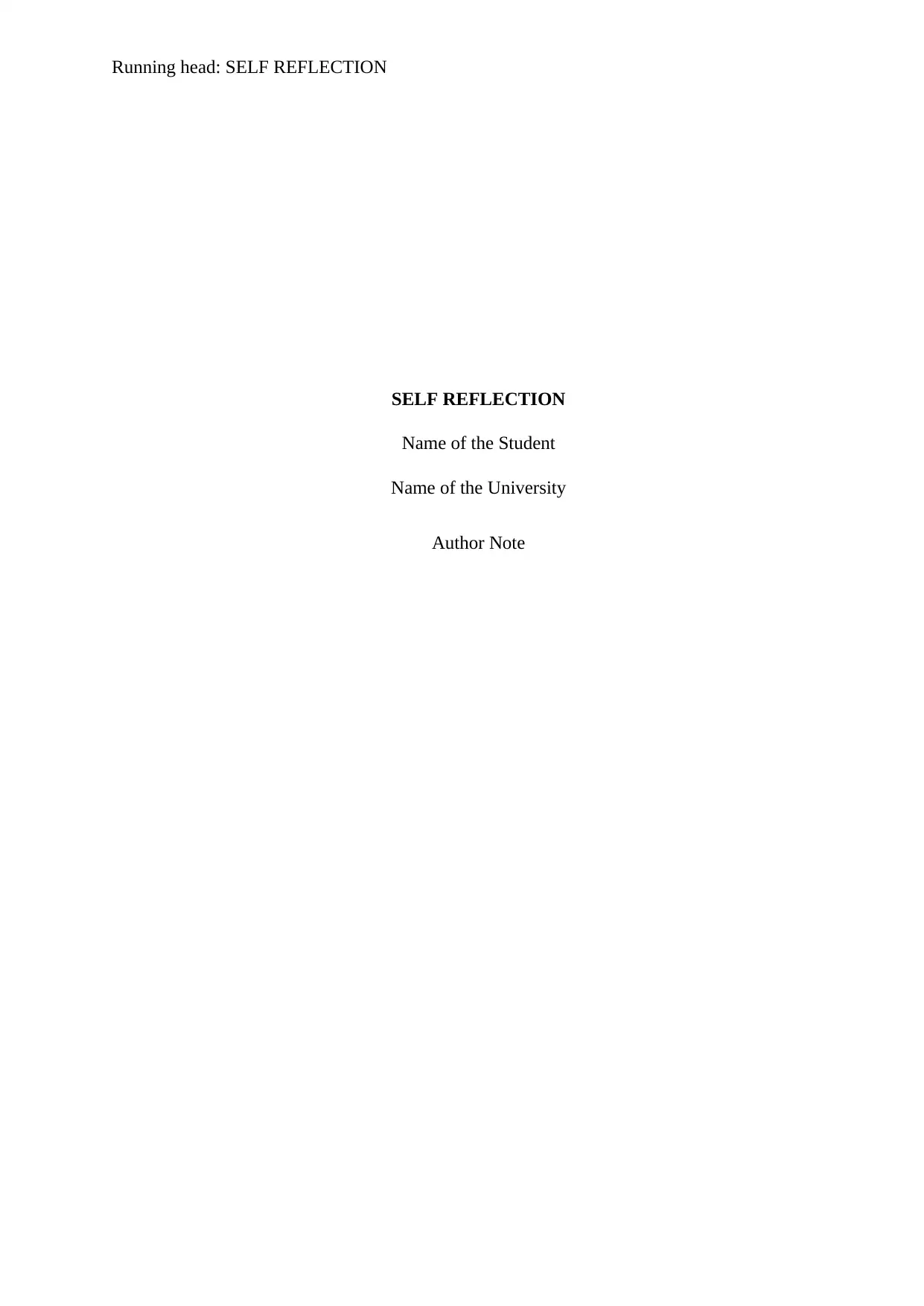
Running head: SELF REFLECTION
SELF REFLECTION
Name of the Student
Name of the University
Author Note
SELF REFLECTION
Name of the Student
Name of the University
Author Note
Paraphrase This Document
Need a fresh take? Get an instant paraphrase of this document with our AI Paraphraser
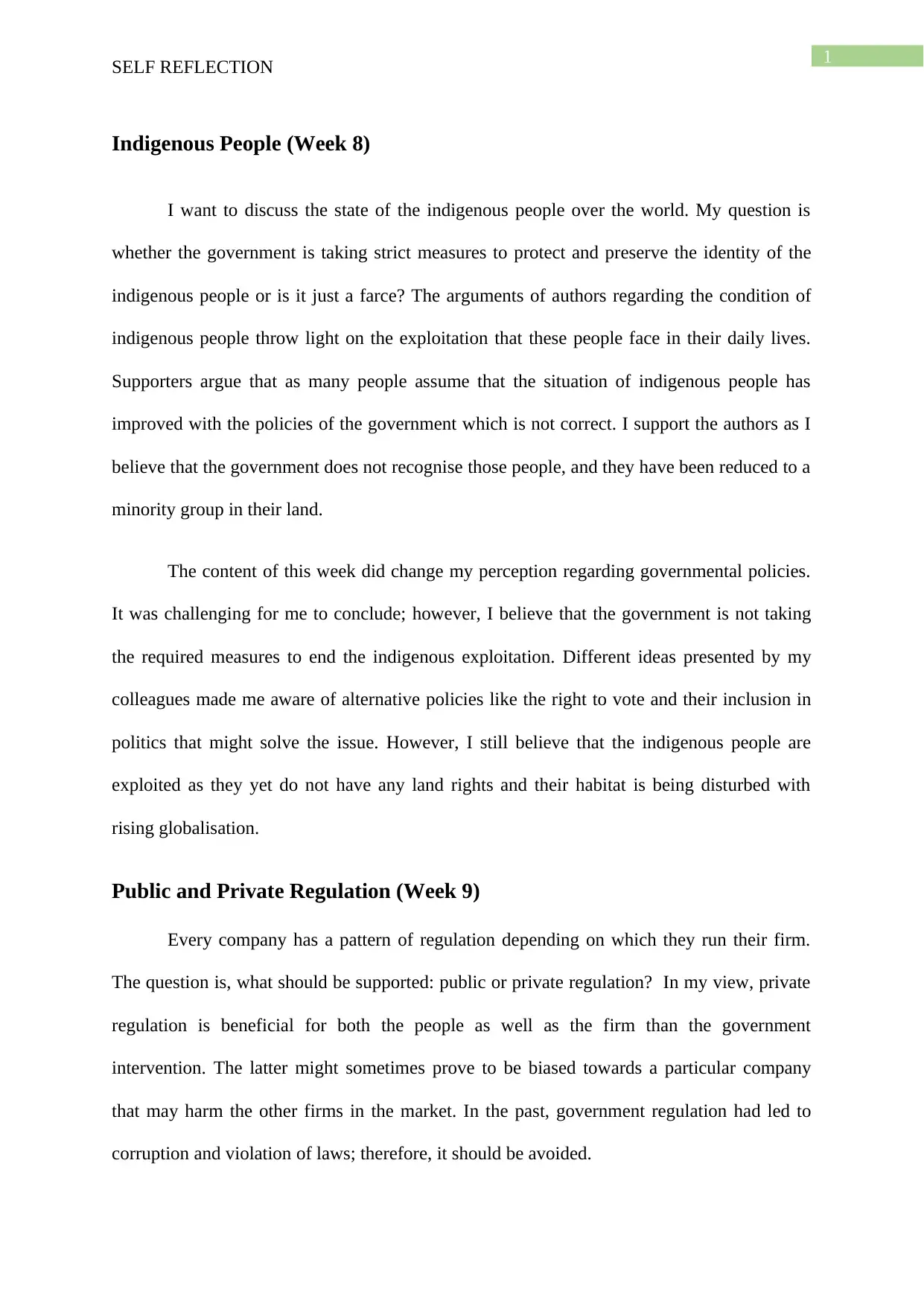
1
SELF REFLECTION
Indigenous People (Week 8)
I want to discuss the state of the indigenous people over the world. My question is
whether the government is taking strict measures to protect and preserve the identity of the
indigenous people or is it just a farce? The arguments of authors regarding the condition of
indigenous people throw light on the exploitation that these people face in their daily lives.
Supporters argue that as many people assume that the situation of indigenous people has
improved with the policies of the government which is not correct. I support the authors as I
believe that the government does not recognise those people, and they have been reduced to a
minority group in their land.
The content of this week did change my perception regarding governmental policies.
It was challenging for me to conclude; however, I believe that the government is not taking
the required measures to end the indigenous exploitation. Different ideas presented by my
colleagues made me aware of alternative policies like the right to vote and their inclusion in
politics that might solve the issue. However, I still believe that the indigenous people are
exploited as they yet do not have any land rights and their habitat is being disturbed with
rising globalisation.
Public and Private Regulation (Week 9)
Every company has a pattern of regulation depending on which they run their firm.
The question is, what should be supported: public or private regulation? In my view, private
regulation is beneficial for both the people as well as the firm than the government
intervention. The latter might sometimes prove to be biased towards a particular company
that may harm the other firms in the market. In the past, government regulation had led to
corruption and violation of laws; therefore, it should be avoided.
SELF REFLECTION
Indigenous People (Week 8)
I want to discuss the state of the indigenous people over the world. My question is
whether the government is taking strict measures to protect and preserve the identity of the
indigenous people or is it just a farce? The arguments of authors regarding the condition of
indigenous people throw light on the exploitation that these people face in their daily lives.
Supporters argue that as many people assume that the situation of indigenous people has
improved with the policies of the government which is not correct. I support the authors as I
believe that the government does not recognise those people, and they have been reduced to a
minority group in their land.
The content of this week did change my perception regarding governmental policies.
It was challenging for me to conclude; however, I believe that the government is not taking
the required measures to end the indigenous exploitation. Different ideas presented by my
colleagues made me aware of alternative policies like the right to vote and their inclusion in
politics that might solve the issue. However, I still believe that the indigenous people are
exploited as they yet do not have any land rights and their habitat is being disturbed with
rising globalisation.
Public and Private Regulation (Week 9)
Every company has a pattern of regulation depending on which they run their firm.
The question is, what should be supported: public or private regulation? In my view, private
regulation is beneficial for both the people as well as the firm than the government
intervention. The latter might sometimes prove to be biased towards a particular company
that may harm the other firms in the market. In the past, government regulation had led to
corruption and violation of laws; therefore, it should be avoided.
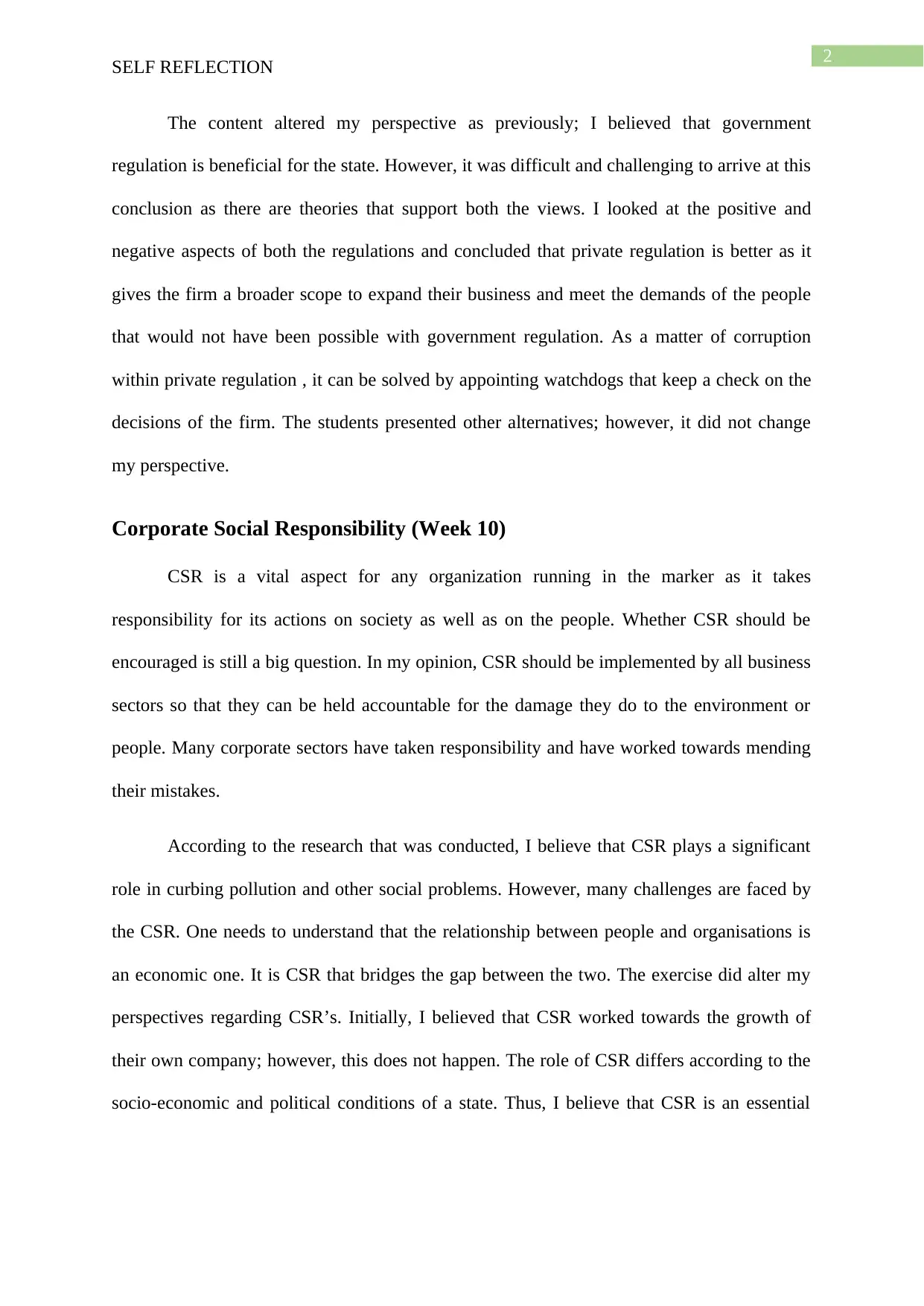
2
SELF REFLECTION
The content altered my perspective as previously; I believed that government
regulation is beneficial for the state. However, it was difficult and challenging to arrive at this
conclusion as there are theories that support both the views. I looked at the positive and
negative aspects of both the regulations and concluded that private regulation is better as it
gives the firm a broader scope to expand their business and meet the demands of the people
that would not have been possible with government regulation. As a matter of corruption
within private regulation , it can be solved by appointing watchdogs that keep a check on the
decisions of the firm. The students presented other alternatives; however, it did not change
my perspective.
Corporate Social Responsibility (Week 10)
CSR is a vital aspect for any organization running in the marker as it takes
responsibility for its actions on society as well as on the people. Whether CSR should be
encouraged is still a big question. In my opinion, CSR should be implemented by all business
sectors so that they can be held accountable for the damage they do to the environment or
people. Many corporate sectors have taken responsibility and have worked towards mending
their mistakes.
According to the research that was conducted, I believe that CSR plays a significant
role in curbing pollution and other social problems. However, many challenges are faced by
the CSR. One needs to understand that the relationship between people and organisations is
an economic one. It is CSR that bridges the gap between the two. The exercise did alter my
perspectives regarding CSR’s. Initially, I believed that CSR worked towards the growth of
their own company; however, this does not happen. The role of CSR differs according to the
socio-economic and political conditions of a state. Thus, I believe that CSR is an essential
SELF REFLECTION
The content altered my perspective as previously; I believed that government
regulation is beneficial for the state. However, it was difficult and challenging to arrive at this
conclusion as there are theories that support both the views. I looked at the positive and
negative aspects of both the regulations and concluded that private regulation is better as it
gives the firm a broader scope to expand their business and meet the demands of the people
that would not have been possible with government regulation. As a matter of corruption
within private regulation , it can be solved by appointing watchdogs that keep a check on the
decisions of the firm. The students presented other alternatives; however, it did not change
my perspective.
Corporate Social Responsibility (Week 10)
CSR is a vital aspect for any organization running in the marker as it takes
responsibility for its actions on society as well as on the people. Whether CSR should be
encouraged is still a big question. In my opinion, CSR should be implemented by all business
sectors so that they can be held accountable for the damage they do to the environment or
people. Many corporate sectors have taken responsibility and have worked towards mending
their mistakes.
According to the research that was conducted, I believe that CSR plays a significant
role in curbing pollution and other social problems. However, many challenges are faced by
the CSR. One needs to understand that the relationship between people and organisations is
an economic one. It is CSR that bridges the gap between the two. The exercise did alter my
perspectives regarding CSR’s. Initially, I believed that CSR worked towards the growth of
their own company; however, this does not happen. The role of CSR differs according to the
socio-economic and political conditions of a state. Thus, I believe that CSR is an essential
⊘ This is a preview!⊘
Do you want full access?
Subscribe today to unlock all pages.

Trusted by 1+ million students worldwide
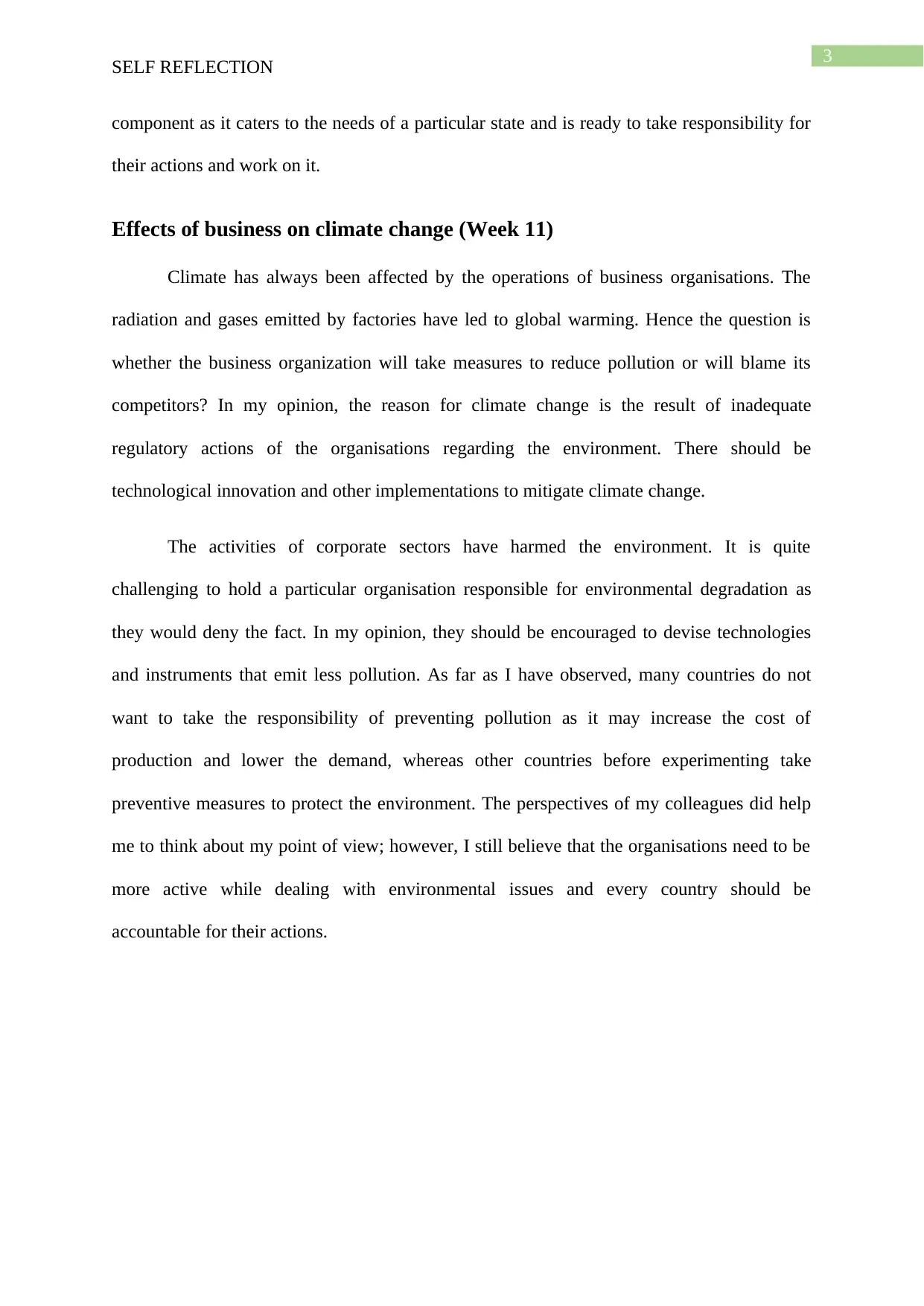
3
SELF REFLECTION
component as it caters to the needs of a particular state and is ready to take responsibility for
their actions and work on it.
Effects of business on climate change (Week 11)
Climate has always been affected by the operations of business organisations. The
radiation and gases emitted by factories have led to global warming. Hence the question is
whether the business organization will take measures to reduce pollution or will blame its
competitors? In my opinion, the reason for climate change is the result of inadequate
regulatory actions of the organisations regarding the environment. There should be
technological innovation and other implementations to mitigate climate change.
The activities of corporate sectors have harmed the environment. It is quite
challenging to hold a particular organisation responsible for environmental degradation as
they would deny the fact. In my opinion, they should be encouraged to devise technologies
and instruments that emit less pollution. As far as I have observed, many countries do not
want to take the responsibility of preventing pollution as it may increase the cost of
production and lower the demand, whereas other countries before experimenting take
preventive measures to protect the environment. The perspectives of my colleagues did help
me to think about my point of view; however, I still believe that the organisations need to be
more active while dealing with environmental issues and every country should be
accountable for their actions.
SELF REFLECTION
component as it caters to the needs of a particular state and is ready to take responsibility for
their actions and work on it.
Effects of business on climate change (Week 11)
Climate has always been affected by the operations of business organisations. The
radiation and gases emitted by factories have led to global warming. Hence the question is
whether the business organization will take measures to reduce pollution or will blame its
competitors? In my opinion, the reason for climate change is the result of inadequate
regulatory actions of the organisations regarding the environment. There should be
technological innovation and other implementations to mitigate climate change.
The activities of corporate sectors have harmed the environment. It is quite
challenging to hold a particular organisation responsible for environmental degradation as
they would deny the fact. In my opinion, they should be encouraged to devise technologies
and instruments that emit less pollution. As far as I have observed, many countries do not
want to take the responsibility of preventing pollution as it may increase the cost of
production and lower the demand, whereas other countries before experimenting take
preventive measures to protect the environment. The perspectives of my colleagues did help
me to think about my point of view; however, I still believe that the organisations need to be
more active while dealing with environmental issues and every country should be
accountable for their actions.
Paraphrase This Document
Need a fresh take? Get an instant paraphrase of this document with our AI Paraphraser
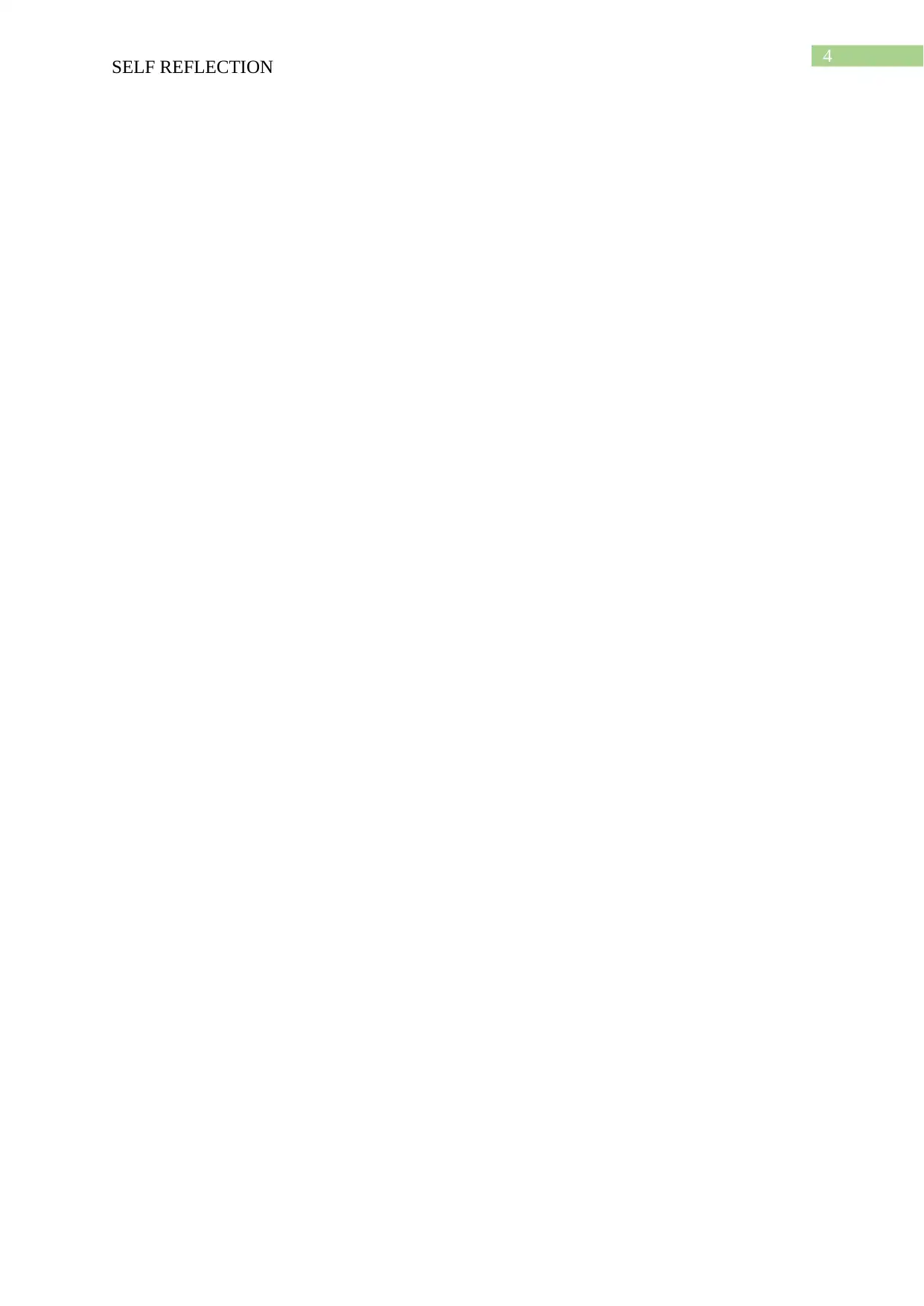
4
SELF REFLECTION
SELF REFLECTION
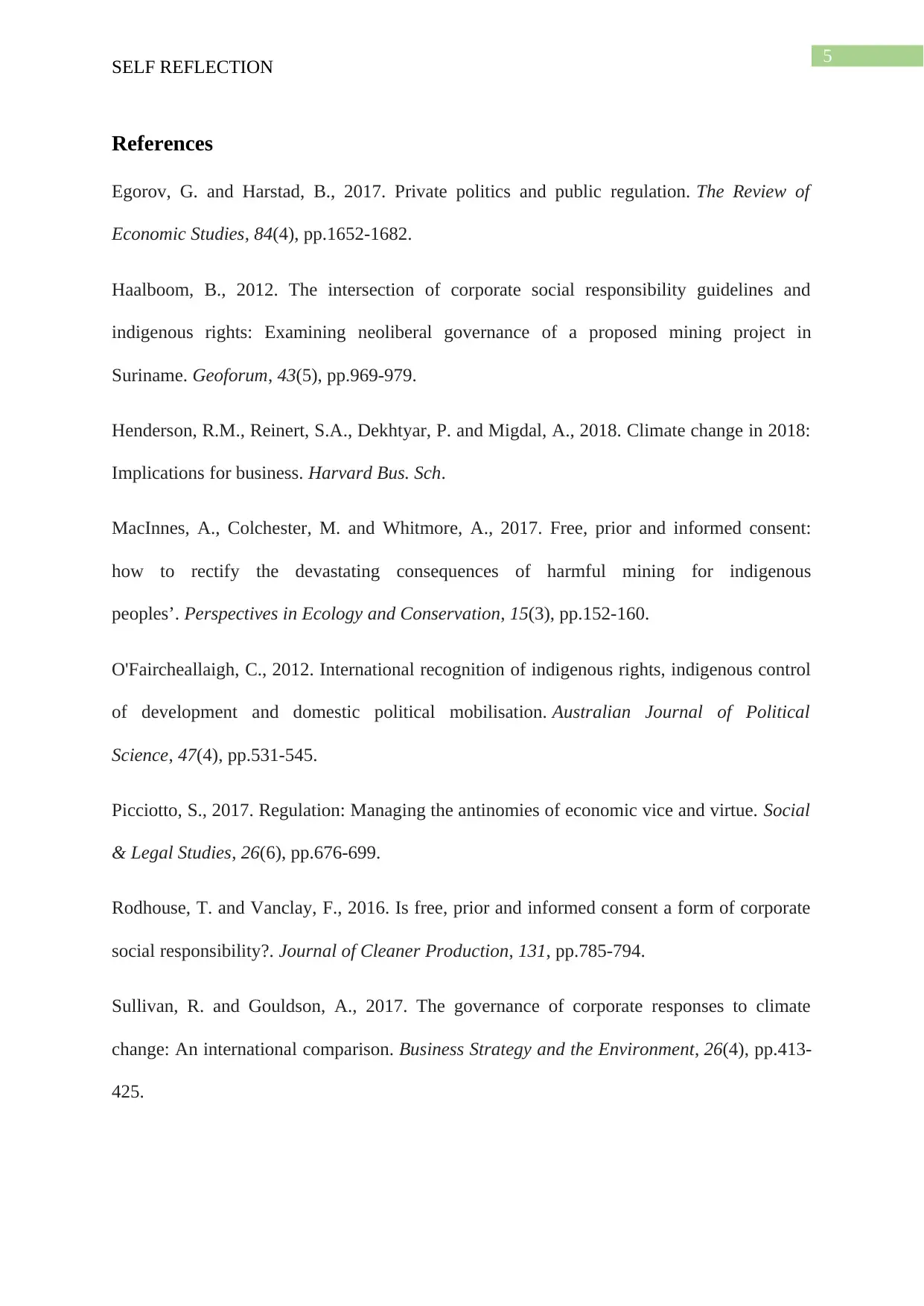
5
SELF REFLECTION
References
Egorov, G. and Harstad, B., 2017. Private politics and public regulation. The Review of
Economic Studies, 84(4), pp.1652-1682.
Haalboom, B., 2012. The intersection of corporate social responsibility guidelines and
indigenous rights: Examining neoliberal governance of a proposed mining project in
Suriname. Geoforum, 43(5), pp.969-979.
Henderson, R.M., Reinert, S.A., Dekhtyar, P. and Migdal, A., 2018. Climate change in 2018:
Implications for business. Harvard Bus. Sch.
MacInnes, A., Colchester, M. and Whitmore, A., 2017. Free, prior and informed consent:
how to rectify the devastating consequences of harmful mining for indigenous
peoples’. Perspectives in Ecology and Conservation, 15(3), pp.152-160.
O'Faircheallaigh, C., 2012. International recognition of indigenous rights, indigenous control
of development and domestic political mobilisation. Australian Journal of Political
Science, 47(4), pp.531-545.
Picciotto, S., 2017. Regulation: Managing the antinomies of economic vice and virtue. Social
& Legal Studies, 26(6), pp.676-699.
Rodhouse, T. and Vanclay, F., 2016. Is free, prior and informed consent a form of corporate
social responsibility?. Journal of Cleaner Production, 131, pp.785-794.
Sullivan, R. and Gouldson, A., 2017. The governance of corporate responses to climate
change: An international comparison. Business Strategy and the Environment, 26(4), pp.413-
425.
SELF REFLECTION
References
Egorov, G. and Harstad, B., 2017. Private politics and public regulation. The Review of
Economic Studies, 84(4), pp.1652-1682.
Haalboom, B., 2012. The intersection of corporate social responsibility guidelines and
indigenous rights: Examining neoliberal governance of a proposed mining project in
Suriname. Geoforum, 43(5), pp.969-979.
Henderson, R.M., Reinert, S.A., Dekhtyar, P. and Migdal, A., 2018. Climate change in 2018:
Implications for business. Harvard Bus. Sch.
MacInnes, A., Colchester, M. and Whitmore, A., 2017. Free, prior and informed consent:
how to rectify the devastating consequences of harmful mining for indigenous
peoples’. Perspectives in Ecology and Conservation, 15(3), pp.152-160.
O'Faircheallaigh, C., 2012. International recognition of indigenous rights, indigenous control
of development and domestic political mobilisation. Australian Journal of Political
Science, 47(4), pp.531-545.
Picciotto, S., 2017. Regulation: Managing the antinomies of economic vice and virtue. Social
& Legal Studies, 26(6), pp.676-699.
Rodhouse, T. and Vanclay, F., 2016. Is free, prior and informed consent a form of corporate
social responsibility?. Journal of Cleaner Production, 131, pp.785-794.
Sullivan, R. and Gouldson, A., 2017. The governance of corporate responses to climate
change: An international comparison. Business Strategy and the Environment, 26(4), pp.413-
425.
⊘ This is a preview!⊘
Do you want full access?
Subscribe today to unlock all pages.

Trusted by 1+ million students worldwide
1 out of 6
Your All-in-One AI-Powered Toolkit for Academic Success.
+13062052269
info@desklib.com
Available 24*7 on WhatsApp / Email
![[object Object]](/_next/static/media/star-bottom.7253800d.svg)
Unlock your academic potential
Copyright © 2020–2026 A2Z Services. All Rights Reserved. Developed and managed by ZUCOL.
